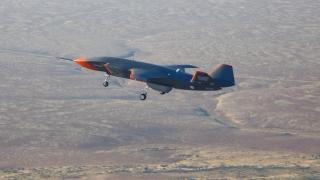The Defence Strategic Review called for a broad approach to national security that requires not just a whole-of-government approach, but a whole-of-nation effort too. This has been enthusiastically embraced by the Albanese government. But the federal government must make funding national security more attractive to draw in another arm of Australian power – the private sector.
There are huge, untapped investment opportunities in Australia’s defence industry and capability development. The problem is that funding “guns and bombs” – while considered patriotic or a necessity in some other countries – is looked down on in Australia.
As the US, NATO, Australia and other nations have struggled to support Ukraine with weapons and especially munitions, the conflict has served to highlight the long-term decline in defence industrial capability among Western nations since the Cold War.
The war in Ukraine has clearly demonstrated the importance of a well-resourced and effective defence industrial base. As the US, NATO, Australia and other nations have struggled to support Ukraine with weapons and especially munitions, the conflict has served to highlight the long-term decline in defence industrial capability among Western nations since the Cold War. Ukraine has also drawn parallels with the potential for a major power conflict in Australia’s region over Taiwan.
Critical to recasting the value and morality of Australia’s defence capability is convincing the Australian public – and hence shareholders of Australian companies – of the social good in supporting national security.
While Ukraine has generated more debate within boardrooms about the place of defence industry in investment portfolios, Australian banks, super and private equity are constrained by so-called Environmental, Social and Governance (ESG) guidelines. The “S” in ESG should include the social good of a secure country, to allow for a thriving society. Defence companies provide a social good in contributing to Australia’s autonomy and strengthening our regional voice. As Foreign Minister Penny Wong says, Australia’s security and regional diplomacy needs to be backed by credible defence capability. A robust defence industrial base it critical to this endeavour and the companies and financial sector actors that produce and, critically, fund this capability are key brokers of our national sovereignty.
Faced with the conflict in Ukraine and heightened tensions in the Indo-Pacific, Western nations have realised the criticality of expanding their defence industrial bases and improving methods of international collaboration. One of the most significant moves was President Biden’s to appeal to the US Congress to add Australia as a “domestic source” within the meaning of Title III of the Defence Production Act. While not addressing major issues of export and intellectual property controls, if ratified, this move would increase investment in Australia’s defence industry and expand cooperation with the United States.
But Australia shouldn’t solely rely on the United States for its defence needs. More needs to be done at home to build Australia’s sovereign defence industry, in partnership with the private sector.
Public support critical
Unlike Europe, war isn’t on Australia’s doorstep. But our region is contested. The South China Sea has been militarised. China is making its views on Taiwan clearer. Cyber, economic, and technology competition is growing and in some key areas has already spilled over into ongoing low-level conflict.
Reinvestment in these arms of national power is a solid start, but implementing the DSR in full will require more innovative and, frankly, higher-risk appetite approaches.
Public support for additional Commonwealth spending will be critical. Increased spending on defence has growing public support. In the 2022 Australian electoral survey conducted around the federal election, there was a 12 per cent increase – from 29 per cent in 2019 to 41 per cent in 2022 – in the public wanting to spend more on defence even though Australians face cost-of-living pressures that dominate the broader election debates. This is the first major increase in over a decade and the biggest jump since the East Timor crisis and 9/11. Clearly, the public’s awareness of the ramifications of the changed strategic circumstances outlined in the DSR is growing.
Importantly, as part of the whole-of-government, integrated approach to national security laid out in the DSR, the government has also committed in the budget to new investments in the Department of Foreign Affairs and Trade, the Office of National Intelligence, and the Australian Secret Intelligence Service. Reinvestment in these arms of national power is a solid start, but implementing the DSR in full will require more innovative and, frankly, higher-risk appetite approaches.
In 2023-24, Defence spending will surpass $50 billion for the first time. But the major question now facing the government is the additional funding to implement the DSR in full. Money is being redirected to the DSR’s recommendations. To start, the government outlined $7.8 billion in budget reallocations. However, these are savings that come from within the existing Defence budget. While this is critical, the government will soon need to inject additional funds into Defence to meet the DSR’s ambitious agenda.
Speaking before the review’s release, Foreign Minister Wong emphasised the need to increase Australia’s defence and spending. She made it clear that Australian “strategic reassurance through diplomacy [must be] supported by military deterrence” and that “serious financial investment” is required to have credible defence capabilities of our own. It therefore surprised many that a significant spending increase was not announced alongside the DSR.
The DSR has provided the impetus needed to fund defence to requisite levels to achieve National Defence. The funding gap it presents also stands to change the government’s approach to the private sector, while its strategic messaging is a catalyst that requires a re-conceptualisation of the public’s perception of Australia’s defence industry. All these factors will need to come together for the DSR and government’s call for the “whole of nation effort” to come to fruition.







